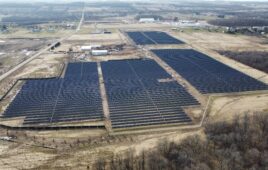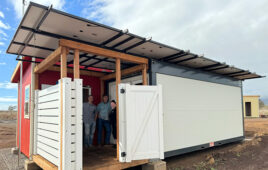A bipartisan group of 231 mayors from Tacoma, Washington, to Ft. Lauderdale, Florida, sent a letter to Congress urging them to pass the Renewable Energy Extension Act (HR 3961/S. 2289), a five-year extension of the solar Investment Tax Credit (ITC).
“More than 200 mayors from 39 states are stepping up to defend the ITC,” said Abigail Ross Hopper, president and CEO of the Solar Energy Industries Association (SEIA). “Mayors are increasingly turning to solar energy to fight the effects of climate change and generate millions of dollars of private investment in their cities. We’re thrilled to have their support as we fight to preserve one of the most successful clean energy policies in U.S. history.”
For years, mayors on both sides of the aisle have provided frontline support for major hurricanes, wildfires, droughts, polar vortices and more. They’ve pushed for sound, long-term solutions to these weather events, including the transition to renewable energy. In fact, 28 of the cities represented have 100% renewable energy commitments.
“As the nation’s largest municipal user of renewable energy, Houston understands that sustainability and resiliency go hand in hand,” said Sylvester Turner, Mayor of the City of Houston. “Continuing to support the growth of renewable energy will help the U.S. lead the energy transition, reduce greenhouse gas emissions, and build smarter, more resilient communities.”
Mayors also understand the local, immediate impacts solar can have on families, businesses and the communities they serve. If extended, recent analysis from SEIA and Wood Mackenzie Power & Renewables finds that the ITC could create an additional 113,000 jobs and $87 billion in economic investment by 2030.
“Adding Hanwha Q Cells to our manufacturing community represents much more than just jobs created,” said Dennis Mock, Mayor of the City of Dalton, Georgia. “Dalton relies heavily on the carpet industry and was hit hard during the last recession. Hanwha affords Dalton the diversity in industry that will help sustain our community and gives other companies confidence in our community and the opportunity to join the budding manufacturing hub in the Southeast.”
The impact of the ITC spans the United States and transcends party affiliation. The bipartisan group of mayors represent large cities like Philadelphia and San Antonio, as well as mid-size and small cities like Wichita, Kansas and Bozeman, Montana. In addition, more than 60 mayors that signed onto the letter are working in districts that have a Republican member of Congress.
The ITC, which is scheduled to start stepping down at the end of 2019, has a proven track record of success. Since its initial passage, the ITC has created more than 200,000 American jobs, added $140 billion in private sector investment, and grown solar deployment by 10,000%.
SEIA is leading a major campaign to push members of Congress to send President Trump legislation that would extend clean energy tax credits, including the solar ITC for five years.
News item from SEIA





It has become apparent to me that in our country’s political game of thrones, as we fight amongst ourselves to control power (which of course is only human nature), many of us have ignored the White Walkers of climate change. The challenge that faces us is finding a way to convince the non-believers that we must work together to defeat a common enemy or none of it will matter in the long run. It’s very frustrating to say the least that when you are trying to convince those to fight with you, they are not just burying their heads in the sand, but instead coming after you as though you are the enemy.
““More than 200 mayors from 39 states are stepping up to defend the ITC,” said Abigail Ross Hopper, president and CEO of the Solar Energy Industries Association (SEIA). “Mayors are increasingly turning to solar energy to fight the effects of climate change and generate millions of dollars of private investment in their cities. We’re thrilled to have their support as we fight to preserve one of the most successful clean energy policies in U.S. history.””
So, this points to 11 States whose mayors are sitting on a pile of coal and are still having a “king of the hill” coal fight. How sad to see in 2019-20. When these (assets) are at the end of useful generation life, what will the local utilities replace them with ? Mechanical generation practices are so inefficient, it should already be criminal to continue on with such projects.